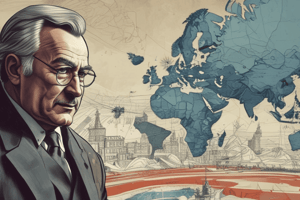Podcast
Questions and Answers
What did the fall of the Berlin Wall in 1989 symbolize?
What did the fall of the Berlin Wall in 1989 symbolize?
- The end of the Cold War era (correct)
- The reunification of East and West Europe
- The division between the capitalist and communist worlds (correct)
- The beginning of the Soviet Union
What was the primary goal of the Soviet system?
What was the primary goal of the Soviet system?
- To establish an authoritarian society based on socialism
- To promote democracy and individual freedom
- To establish an egalitarian society based on socialism (correct)
- To establish an egalitarian society based on capitalism
Who initiated reforms to modernize the USSR in 1985?
Who initiated reforms to modernize the USSR in 1985?
- Yeltsin
- Mikhail Gorbachev (correct)
- Stalin
- Lenin
What led to the dissolution of the Soviet Union in December 1991?
What led to the dissolution of the Soviet Union in December 1991?
What was the consequence of Gorbachev's reforms on the Soviet Union?
What was the consequence of Gorbachev's reforms on the Soviet Union?
What was the consequence of Gorbachev's reforms in East European countries?
What was the consequence of Gorbachev's reforms in East European countries?
What was the result of the shift towards liberal democracy in post-communist regimes?
What was the result of the shift towards liberal democracy in post-communist regimes?
What was the consequence of the breakup of Soviet-era trade alliances?
What was the consequence of the breakup of Soviet-era trade alliances?
What was the result of India's relations with post-communist countries?
What was the result of India's relations with post-communist countries?
What was the consequence of the end of bipolarity on global power dynamics?
What was the consequence of the end of bipolarity on global power dynamics?
Flashcards are hidden until you start studying
Study Notes
The Fall of the Berlin Wall and the End of the Cold War
- The fall of the Berlin Wall in 1989 marked the end of the Cold War era and the collapse of the Soviet bloc.
- The unification of Germany and the disintegration of communist regimes in Eastern European countries followed.
- The Soviet Union, facing internal and economic challenges, eventually disintegrated.
The Berlin Wall
- Symbolized the division between the capitalist and communist worlds.
- Erected in 1961, it separated East Berlin from West Berlin.
- Toppled by the people on November 9, 1989, signifying the reunification of Germany and the beginning of the end of the communist bloc.
The Soviet System
- The USSR, formed in 1917, aimed to establish an egalitarian society based on socialism.
- The Soviet political and economic systems were replicated in Eastern European countries, forming the 'second world' or socialist bloc.
- The Soviet system faced internal challenges, including bureaucracy, lack of democracy, economic stagnation, and the burdens of military spending.
Gorbachev and the Disintegration
- Mikhail Gorbachev, General Secretary of the Communist Party from 1985, initiated reforms to modernize the USSR.
- These reforms unintentionally triggered mass protests in Eastern European countries, leading to the collapse of communist regimes.
- Gorbachev's attempts at democratization faced opposition from hardliners, resulting in a coup in 1991.
- Yeltsin's resistance to the coup and the desire for sovereignty led to the dissolution of the Soviet Union in December 1991.
Why Did the Soviet Union Disintegrate?
- Internal weaknesses, economic stagnation, and a growing awareness of Western advancements contributed to the collapse.
- Gorbachev's reforms, while addressing some issues, unleashed uncontrollable forces, and nationalist aspirations accelerated the disintegration.
Consequences of Disintegration
- End of Cold War Confrontations:
- Ideological dispute between socialism and capitalism ceased.
- Demanded an end to the arms race and a shift towards peace.
- Power Relations and Ideological Shifts:
- The U.S. emerged as the sole superpower.
- Capitalism became the dominant economic system.
- Liberal democracy gained prominence politically.
- Emergence of New Countries:
- Former Soviet Republics gained independence, leading to diverse identities and interests.
- Shock Therapy in Post-Communist Regimes:
- Transition to democratic capitalism involved 'shock therapy', emphasizing:
- Complete shift to a capitalist economy.
- Privatization of state assets.
- Drastic changes in external orientation, promoting free trade.
- Breakup of Soviet-era trade alliances.
- Transition to democratic capitalism involved 'shock therapy', emphasizing:
Consequences of Shock Therapy
- Economic hardships, ruin, and disparities in wealth.
- Loss of state-controlled industries and social welfare.
- Emergence of mafias, disparities, and economic instability.
Tensions and Conflicts
- Post-communist countries experienced civil wars, secessionist movements, and ethnic conflicts.
- Central Asian republics became zones of competition for outside powers.
India and Post-Communist Countries
- Strong relations, especially with Russia, rooted in history and shared interests.
- Multipolar world vision and strategic cooperation, including defense and energy collaboration.
- India benefits from Russian support on various global issues, and Russia benefits from India's role as a significant arms market and energy importer.
Studying That Suits You
Use AI to generate personalized quizzes and flashcards to suit your learning preferences.




